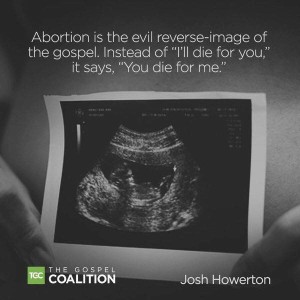 Article: Yahweh’s rebuke of abortion by Jesse Johnson (original source but often overlooked is the encounter between Yahweh and Moses described in Exodus 3-4. This passage is particularly applicable to those considering abortion because of some perceived defect or genetic disability diagnosed in the baby.
Article: Yahweh’s rebuke of abortion by Jesse Johnson (original source but often overlooked is the encounter between Yahweh and Moses described in Exodus 3-4. This passage is particularly applicable to those considering abortion because of some perceived defect or genetic disability diagnosed in the baby.
The scene is this: Moses had been in Midian for decades, and had obviously settled down. He had a wife, a family, and a job. But Yahweh “remembered” Israel, called Moses out of retirement, and told him to go and lead the Israelites to freedom.
Moses declined, and gave a series of excuses to God. First, he said he wasn’t sufficient (God’s answer: of course you aren’t, but the Lord is). Then he said he didn’t even know who God is (God’s answer: Yahweh). His third objection was that nobody would believe Yahweh spoke to Moses (God’s answer involved leprosy, snakes, and turning water into blood).
But then Moses got personal. He told God that he couldn’t go lead Israel, because his tongue didn’t work. God made him with a defective mouth. Literally, he says “my tongue is too heavy, my speech is unintelligible” (there is debate in commentaries about if Moses always had this impediment, or if he developed it by burning his tongue with a coal, as many Jewish historians allege). The point is Moses couldn’t talk well, and—in the interest of full disclosure—God should know about that if he is going to ask him to lead.
And here is where Yahweh’s response to Moses’ objection gives a window into why God hates abortion:
“Then Yahweh said to him, “Who has made man’s mouth? Who makes him mute, or deaf, or seeing, or blind? Is it not I, Yahweh? Now therefore go, and I will be with your mouth and teach you what you shall speak.”
This answer teaches us at least three truths about the evil of abortion:
It is Yahweh who creates life.
God’s response begins by declaring that he is the one who makes man. People don’t just appear—they are made by Yahweh. This is what David had in mind in Psalm 139:13 (“you formed my inward parts”). That God is the creator is obvious with Adam and Eve—but it is equally true with every human being.
I know you can’t read the tone of someone’s voice when their words are written, but Yahweh’s rhetoric sounds at the very least aggravated with the implication that Moses’ life belongs to Moses. God made Moses, and this is true because God makes all life.
It follows then that abortion is evil because it murders a life that God himself had made.
Yahweh even makes those with “disabilities.”
When he declares that he is the one who made Moses, Yahweh doesn’t generically claim that he is sovereign over all life. Instead, he specifically hones in on what Moses had described as a disability. Moses tried to use his misformed tongue as a reason to not obey God, to which God replies, “who do you think made your tongue?”
To our looks-obsessed, externally driven, achievement-oriented culture, Moses’ disability would be seen as a liability: a product of nature, or perhaps (in the more spiritually minded) the fruit of living in a fallen world. But to God, Moses’ mouth was Yahweh’s handiwork.
It follows then that parents who pursue abortion because of a perceived malformity in their child are pursuing something evil, because they are viewing something that God made, and calling it unwanted. If a person is willing to end life because that life does not meet their standards, they are actually seeking to end the life of a person God has made—and God has made that person exactly like he wanted to.
Yahweh can use all people for his purposes
The problem with Moses wasn’t his speech, but his lack of faith. God did not simply tell him, “Look, I made you,” but instead goes on to say, “I made you, and I will use you.”
Yahweh took Moses’ weakest point and declared that he made Moses that way intentionally, and he did so in order to use him. Moses thought he couldn’t lead because he wasn’t made well, and God said, “I made you that way so I could lead you.”
This truth is seen in the New Testament as well. Paul says that God chooses to use the weak things of the world to shame the strong (1 Corinthians 1:27-29). God often saves the disabled, so that God gets all of the glory.
It follows then that abortion (especially in the case of perceived deficiencies in the baby) is evil because it denies that God can use the foolish things of the world to shame the wise.
Yahweh’s rebuke of Moses was more than a mere rebuttal of his apathy—it strikes at the heart of what it means to esteem life.
 When I worked at Planned Parenthood, I was trained to be a POC technician. POC stands for “Products of Conception.” Sometimes, if the staff were feeling funny, we would say that it stood for “Pieces of Children.”
When I worked at Planned Parenthood, I was trained to be a POC technician. POC stands for “Products of Conception.” Sometimes, if the staff were feeling funny, we would say that it stood for “Pieces of Children.”
